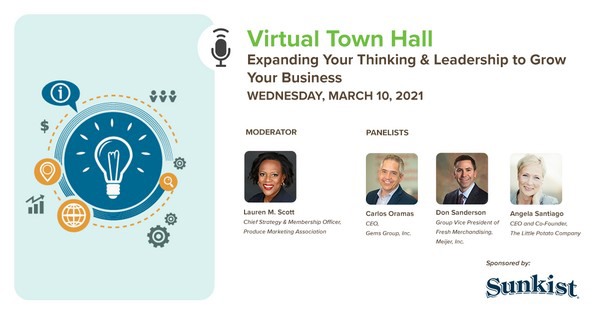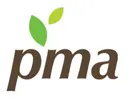It is important to stay agile, innovative and open-minded to grow your business in any year, but with the uncertainty of the past year it has never been more important to embody these characteristics for the success and survival of your business. In this week’s PMA Virtual Town Hall, companies both within and outside of the fresh floral and produce industry shared their expertise on how to expand your thinking and fine tune leadership to grow your business. Panelists Carlos Oramas, CEO, Gems Group, Inc.; Don Sanderson, Group Vice President Foods and Meijer Express, Meijer; and Angela Santiago, Chief Executive Officer, The Little Potato Company joined PMA Chief Strategy & Membership Officer, Lauren M. Scott to discuss lessons learned from the case studies of companies that have expanded their thinking to grow their product line, operations, and teams.
Click here for the Virtual Town Hall recording

To start off the session, Scott asked each participant why it is important for leaders to expand their thinking by looking inside and outside of the industry. It was clear between all three participants that it is important to look both within and outside of the industry to have the most success in expanding thinking. A leader’s initial tendency might be to look within the industry because that is where they know they can find the pulse of what is happening within their business. Inside the industry is where leaders can find perspectives on how their business is currently operating and how they can improve existing systems. When looking inside the industry or business, it is important to look both wide and deep. While the decisions may be made in the boardroom, leaders will be able to see and experience what is happening on the floor or in the field by talking to the people doing the work.
While looking inside the industry and business is helpful for industry perspective, there are benefits to looking outside the industry as well. Looking outside the industry, leaders can find perspectives on a lot of the same challenges we face in the fresh produce and floral industry approached from a different lens. This gives leaders the ability to find inspiration and creativity from an alternative approach to the issue. For instance, not all businesses and industries advance at the same rate. By looking outside the industry for solutions, leaders may be able to learn from other industries or businesses because they are ahead of or more advanced than we are as an industry.
After answering this initial question, participants shared dissected, discussed and applied leadership themes from case studies in six different key areas of business to the fresh produce and floral industries. Here are the relevant takeaways from each case study.
Consumer: The Tylenol Crisis
In one of the most infamous crisis situations faced by a business, in 1982 Tylenol faced an instance where someone tampered with the capsules causing several deaths and illnesses in Chicago. Participants discussed why doing the obvious thing is sometimes difficult and how the innovations can spring from pain points and challenges. Here were some of the key points from the discussion:
- Businesses often over complicate and overthink the solution to a challenge which leads to more questions and inaction.
- The truth is often the simplest and clearest answer.
- COVID-19 and the innovations and changes to our industry are a prime example of innovation springing from pain points.
- Finding innovation in the face of adversity is more about speeding up and applying things that already exist in new ways.
Customer Relationship: When the Customer Can’t Pay
With COVID-19 impacting so much of the industry, it was inevitable that receivables were going to get low for some businesses, particularly when cash flow became an issue. In looking at the issue of receivables and slow payment throughout the pandemic, participants addressed having the difficult conversations to strengthen your business relationships and how to fix potentially strained relationships.
- At the end of the day, we are all talking about and talking with human beings.
- AI technology will never replace the human connection formed through business relationships.
- The very fundamental need for trust is what builds all relationships and sometimes having such difficult conversations can strengthen the trust between two organizations.
- Sometimes the best thing to do for a strained relationship is to own up to what you’ve done wrong and then humanly try to find a path to make it right.
- Something that is helpful to mending strained relationships is putting yourself in the other person’s shoes.
- Assume positive intentions and ask the questions that will help bring clarity to the situation before making assumptions.
Employee Engagement: Turn Around in Touch Times
When the new CEO took over MGM, he implemented a successful plan to improve the business by speaking with every person within the company. He asked questions and found very simple things that needed to be adjusted and changed and conducted daily huddles to stay up to date on the day-to-day of the organization. As a result company morale grew, and the business thrived. This study showcases the benefit of listening to your team and incorporating that in the day-to-day. In this section, participants discussed how to get to the truth of what’s going on and how to get people to speak truth to power.
- As a culture, people are too uncomfortable asking questions.
- In order to get to the truth of what’s going on, it is important to ask “why” and to continue to ask difficult questions.
- Asking why can empower the team to think past failure.
It is on leadership to initiate conversations to encourage employees to speak truth to power. - Ways to encourage open dialogue could include: small group chats, one on one conversations, the opportunity to submit questions ahead of time and the opportunity to submit questions anonymously.
- It is important for leaders to lead by example.
Operations: Hickory Farms
For the holidays or for gits, Hickory Farms has many sausages, cheese, crackers and nuts, and with all of those different products, come different configurations, price points and therefore Stock Keeping Units (SKUs). As a result, Hickory Farms SKU portfolio ballooned. With all the right intentions to meet the needs of the market and consumers needs, the SKU portfolio became an operations nightmare. As a result the Hickory Farms operations team went in and slashed the amount of SKUS from somewhere around 30,000 down to 7,000 and were able to create a price reduction for consumers and create strong growth for the brand. In this case study, participants discussed the role of SKU rationalization and innovation and how it might change over time.
- When you’re creating too many SKUs it will eventually become iteration rather than innovation, at which point you have to switch focus.
- Sometimes less is more. Fewer SKUs with more quality will serve the needs of consumers better.
- Ask yourself: What exactly is the need we’re meeting with this addition?
- As a supplier it is better to trim down your supply before a retailer does it for you.
- You have to keep the customer needs and wants at the forefront.
Strategy: Tesco’s International Expansion
When Tesco, one of the largest retailers in Europe, decided to expand into the Korean market, they knew little about the market they were breaking into. To combat this lack of knowledge and information, they partnered with Korean company Samsung to appear more local as opposed to a multinational company coming into Korea. Participants discussed this example of how you can know what you don’t know and how to balance your brand versus the market dynamics.
- As you expand into new areas, be gracious with yourself and allow the organization to grow and learn as you go.
- While consumers may be looking for local, there is always a case to be made for looking elsewhere.
- Suppliers can still provide the emotional connection with the consumer, even if the product was not grown in their back yard.
- When entering a new market, you need to not only know the market and the consumers, but also know yourself and your business.
- Play to your brands strengths no matter the market.
- When in doubt, go back to the basics and fundamentals to help your business thrive.
Talent: Talent and Succession Planning
Talent is incredibly important to any organization. The resourcefulness of talent is what got many companies through the pandemic. As a family owned business, Carlson leaned into the family for talent and succession. Eventually the family hit a point where there were no more family members to take over and they needed to think about succession and talent development of talent throughout the organization and not just the family. Participants here shared job skills they anticipate will be important in the future and what the role of development looks like to the organization and individual.
- There is no one right answer or way to do things. It is important to be open minded and learn as you go.
- Flexibility will drive different behaviors and expectations from all individuals and the workforce.
- Understanding where the industry and business are going help leads to what skills will be necessary in the future.
- It is important to trust employees and give them opportunities to learn.
- Acknowledge and appreciate employees who challenge the status quo.
- Development is important for building confidence, competent and impactful contributors.
To close out the session, Scott asked each participant to fill in the blank for the following statement: “A leader sometimes needs to be ___ and never should ___ but always be ___.” Here are the answers:
- “A leader, sometimes needs to just make the decision and never should lie, but always lead by example.”
- “A leader, sometimes needs to just get out of the way and know when to do that and should never be satisfied but should always be curious and lead with their heart.”
- “A leader sometimes needs to be vulnerable and never should avoid perspectives but always be learning.”
Click here for more information on the past and upcoming webinars.
For more information
Produce Marketing Association (PMA) www.pma.com
www.pma.com
